|
Powered by WordPress
|
Sunday: April 25, 2010
Aunt Bernice: “The government’s been overthrown, and guess who’s responsible.”
Ajax: “Wait! I know this. Eli Whitney? Harriet Beecher Stowe? Aaron Burr?”
Aunt Bernice: “No, Ajax.”
Ajax: “Unless it’s someone named Isosceles Triangle, I’ve wasted a whole year of school.”
(Duckman, Episode 30: ‘A Clear and Presidente Danger’)
Saturday: August 1, 2009
Yesterday I saw for the first time Rossini’s first opera, the one-act farce La Cambiale di Matrimonio (The Bill of Marriage). It is set in England, and the most amusing character is the Canadian Slook, who has crossed the Atlantic to pick up his mail-order bride. The DVD version I saw, directed by Michael Hampe and conducted by Gianluigi Gelmetti, puts Slook (Alberto Rinaldi) in a delightfully primitive Canadian costume. He arrives on a cold day dressed in furs and carrying a gun in one hand and a pair of peacepipes in the other:

Once inside he takes off his fur coat and hat to reveal a buckskin jacket with fringes, plaid shirt, and something that looks like a more elaborate version of a bolo tie:

How much of the costume is implied in Rossini’s score (1810) and how much is the director’s idea (1989) I do not know. I can heartily recommend the recording, which is well-sung, well-acted, and pleasingly free of Eurotrash pretensions. It is included in a very reasonably-priced box set of four early one-act operas. I bought it for $20.99 a few days ago, though the current low price on Amazon Marketplace is $24.25 new. Not bad for four delightful works in one package. On the other hand, the picture of the composer on the box may deter some buyers.
Sunday: July 19, 2009
I drove to Charlottesville today to see an HD broadcast of Racine’s Phèdre by the UK National Theatre, with Helen Mirren in the title role. Some desultory thoughts:
- At 56, I was probably younger than the median audience member. I hope they are being replaced by the newly old as they die off.
- The set was all scabby white concrete walls and floors on a more-than-human scale, like a modern art museum without any art on the walls, the kind where the art wouldn’t be missed. The vaguely archaic water fountain was an odd touch. On the right was a low wall with a bright blue sky behind it, which very effectively suggested a seawall with the shore just behind it.
- The Paramount Theater is well worth seeing in itself, and I’m going back in a week for a live performance of The Marriage of Figaro by Ashlawn Opera.
- When I saw Tartuffe in Charlottesville a couple of months ago, I was surprised by how simple the plot was, compared to Shakespeare’s comedies. With Phèdre, I was surprised how complicated the plot was, but that’s because I was semi-unconsciously comparing it to Euripides and Seneca, not Shakespeare. (It’s been 35 years since I read any Molière or Racine, and I’d never seen either on stage.)
- The translation, by Ted Hughes, worked tolerably well. It was advertised as ‘free verse’, but might as well have been prose, for all I could tell. It was mostly successful at avoiding stiff archaisms and disconcerting modernisms, though “futile placebo” sounded odd for a classical hero or a neoclassical playwright. The best line came from the nurse, Oenone: “this longing for death is going to kill us both”. How much of that is Racine, and how much Hughes, I do not know.
- The sound effects were irritating: mostly dull roars (to respresent the adjacent sea?) and indistinct wooshes. There were two glitches in the transmission, where the picture froze and the sound went off or changed to static, but neither lasted more than 4-5 seconds.
- I wondered whether people would clap at the end. It’s a natural response to a successful production, but the actors couldn’t hear us, and we knew it, which made it unnatural after all. As it turned out, there was plenty of clapping broadcast from London, so the brief flurry of scattered local claps quickly died down. The actors couldn’t see us, either, so most of us headed for the doors as soon as the show ended, not sticking around to watch the actors take their bows, assuming that was also broadcast.
- As for the acting, what can I say? Very professionally done, probably as well-done as a prosy translation of a verse play in a foreign language can be done. I’d like to see a French production some day, though I’d need subtitles. I will certainly go see the National Theatre’s next simulcast, All’s Well That End’s Well in October. I’m curious to see how it will compare to the American Shakespeare Center’s touring production, which will be previewing in town the first week of September.
Saturday: July 18, 2009
“Children need religion. They can always give it up later.”
(Le Plaisir, 1952)
Saturday: June 6, 2009
An English English professor — I mean an Englishman who is also a professor of English — mocks the hard sciences to a mathematician:
A great poet is always timely. A great philosopher is an urgent need. There’s no rush for Isaac Newton. We were quite happy with Aristotle’s cosmos. Personally, I preferred it. Fifty-five crystal spheres geared to God’s crankshaft is my idea of a satisfying universe. I can’t think of anything more trivial than the speed of light. Quarks, quasars — big bangs, black holes — who gives a shit? How did you people con us out of all that status? All that money? And why are you so pleased with yourselves?
. . . . . . . . . . . . . . . .
I’d push the lot of you over a cliff myself. Except the one in the wheelchair, I think I’d lose the sympathy vote before people had time to think it through.
(Tom Stoppard, Arcadia, Scene 5)
Tuesday: February 10, 2009
“The dead weep with joy when their books are reprinted.”
“Everyone can see the future, but no one remembers the past.”
(The Stranger, in Russian Ark, 2002)
Monday: February 9, 2009
“Unhappiness is our own invention. At times I’m sad that I lack the imagination for it.”
(Général André de . . ., in The Earrings of Madame de . . ., 1953)
Tuesday: November 11, 2008
I’m not sure why my comments aren’t working, and why I can’t even use FTP. Until I can fix that, readers may contact me by e-mail at the following address, after carefully reversing it: gro.liveewrd@liveewrd.
Sunday: September 30, 2007
Amazon and other retailers offer four BBC Shakespeare DVD box sets, of five plays each: Comedies, Histories, Tragedies, and Tragedies II. The list price is $149.99 per box, and Amazon doesn’t discount them nearly as much as most of their DVDs. As I write, the Amazon prices are $134.99 for two of them, $129.99 for the other two, which is as low as I’ve ever seen them. To judge from the three I’ve seen, they are excellent productions, but $529.96 plus shipping for 20 plays is an awful lot of money, and the seventeen plays not available include some of those I most wanted to see — not least because they are exactly the ones I’m unlikely ever to see in a theater.
There is a simple solution, which I owe to a former colleague I’ll call ‘Dr. Johnson’ for his erudition. Amazon UK sells all 37 canonical plays in a big box for a lot less. When I bought them in May, the price was $238.11, including air-freight shipping: they arrived in six days. The Sterling price must have been £115 or so. As I recall, it was £130, and they subtracted £15 for VAT tax since it was being shipped to North Carolina, where we are not eligible for the VAT-funded National Health. The exchange rate has worsened a bit since then, but the Sterling price is now £99,98 including (I assume) VAT. However you calculate it, buying all 37 plays from Amazon UK costs less than half of what it costs to buy only twenty of them from Amazon US. I wonder if it was the BBC’s idea to soak the colonists? Of the three I’ve watched so far, the best (Winter’s Tale and The Merchant of Venice) are not available in the U.S. (The other is Julius Caesar: not bad, but it didn’t grab me like the other two.)
Of course, you will need a Region 2 or all-region DVD player to play the discs, but even a better-than-average all-region DVD player cost me only $170. It will be useful for more than just BBC Shakespeare. Other movies not available in region 1 versions include three Bergman movies from the U.K. with English subtitles and the Orson Welles Shakespeares (Othello, Macbeth, and Chimes at Midnight) with South Korean subtitles. Even some American movies are only available in Region 2: until the Criterion edition came out a few weeks ago, Jim Jarmusch’s Night on Earth was only available in a U.K. edition. I’m so glad ‘Dr. Johnson’ told me about the Amazon UK edition before I bought any of the U.S. boxes.
Saturday: August 11, 2007
I haven’t read the novel in over 30 years, but bits of the German television miniseriesDoktor Faustus (1982) were familiar. Here’s one I’d forgotten (assuming it is in the book) — Satan in the guise of a theology professor (the unusually goatish goatee should have been a tipoff):
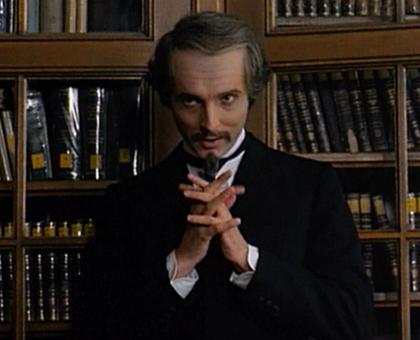
Verdict: not bad for a made-for-TV version of a novel. Of course, period detail goes a long way in making up for the omission of many of the characters and almost all of the words. Not that the period detail is flawless: some of the books in the cabinet behind Prof. Dr. Satan seem to have clear plastic dust jackets, which I’m pretty sure were not available a century ago. (The scene is set somewhere between 1905 and 1909.)
The credits include an interesting line: “Musik: Benjamin Britten, Rolf Wilhelm”. I wonder which one wrote the works of the fictional composer Adrian Leverkühn. If it was Britten, he did not do so knowingly, since he died in 1976. In any case, I hadn’t thought he wrote any twelve-tone works, so perhaps he provided some of the mood music, while Wilhelm impersonated Leverkühn for the concert scenes.
Monday: July 30, 2007
In honor of Ingmar Bergman’s death, announced today, I watched the first movie he directed, Crisis (Kris, 1946):
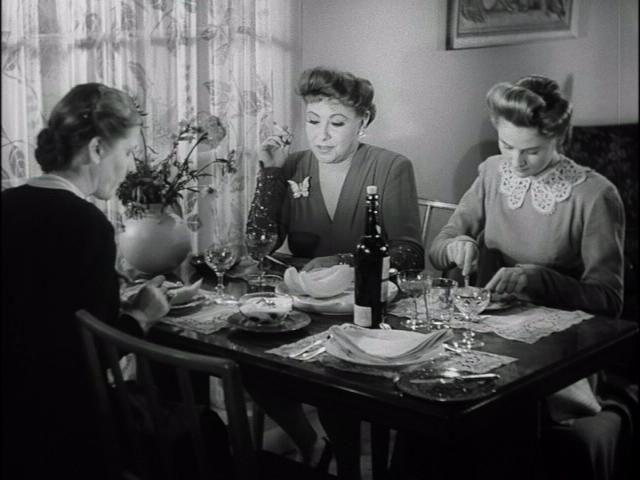
Verdict: gripping. My only complaint is that the opening voice-over seemed to be laying it on a bit thick in describing the idyllicness (idyllicity?) of the small town in which most of the movie is set. Once the characters started talking I was sucked in. Now I can’t decide whether to watch it again or to watch the next ones in the Early Bergman box. I suppose the latter would be more sensible.
Puccini’s Gianni Schicchi, the 2004 Glyndebourne production:
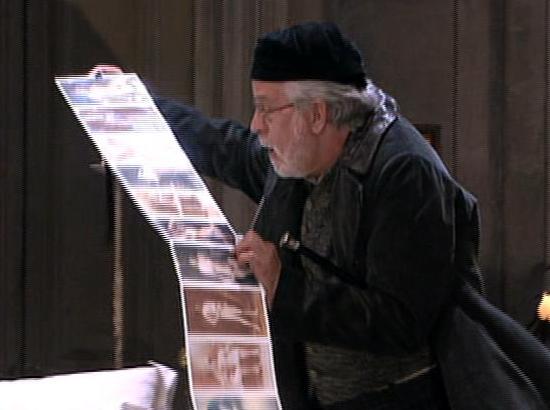
I’ve seen all of Il Trittico once before (on DVD) and found Il Tabarro a terrible bore, Suor Angelica only intermittently interesting, mostly in the bits of church music, and Gianni Schicchi thoroughly entertaining. I wonder why Puccini didn’t do more comedies.
Friday: July 27, 2007
Le Samouraï (1967). I particularly liked the color scheme, which started out almost black and white, and never expanded much beyond grays and dull greens and blues and various dirty pastels. Even the police chief’s red desk wasn’t all that red.
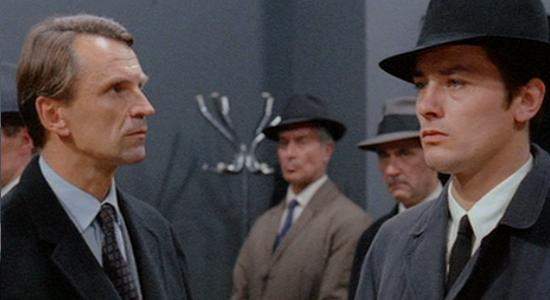
At least to judge by this movie, French policemen in the ’60s were already well ahead of today’s Durham, North Carolina, Police Department when it comes to handling lineups. Here the witness (left) must identify the suspect (right) after the latter has been made to switch hats and coats with two other men in a group of fifteen or so. The fact that he can say he saw a man with that hat, that coat, and that face convinces the police that they have the right man.
Handel’s Julius Caesar (Giulio Cesare), in English translation, conducted by Sir Charles McKerras, and starring Dame Janet Baker as Caesar. She was in fine form, but my favorite character was the villain, Cleopatra’s brother Ptolemy XIV, anachronistically described as ‘Pharaoh’ and sung by James Bowman:
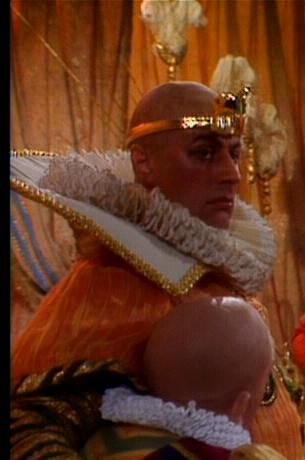
That Ptolemy was also Cleopatra’s husband was not, I think, mentioned. I wonder whether Mike Meyers saw this production and borrowed a few hints for Dr. Evil.
Monday: February 12, 2007
. . . . because otherwise it’s the worst toupee ever made:
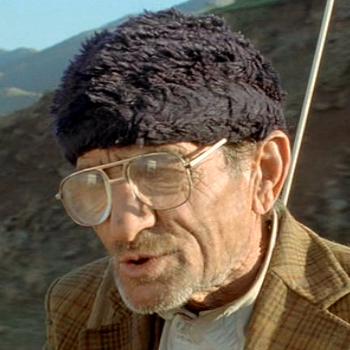
This is a cropped still from Turtles Can Fly, and the man is an Iranian Kurdish doctor visiting Iraq in early 2003 to try to find an armless boy who can allegedly foretell the future. Not a bad movie, if you can get past the hat.
Comments Off on I Hope This Is A Hat . . . .
Sunday: December 31, 2006
Over the last year, I haven’t had time to read a lot of books, but have finally started to catch up on some of the movies I’ve missed out on over the years. Some were checked out of the U.N.C. library, some I bought, but most came from Netflix. In 2006, I watched 98 movies, one of them twice, only two previously familiar, plus 20 shorts. (At least half a dozen more I’d seen many years before, but more or less forgotten.) Some brief notes:
- Best: perhaps Smiles of a Summer Night — I hadn’t realized that Bergman could be funny. All I remember from college is The Seventh Seal, Virgin Spring, and some contemporary scenes of emotional torture and self-torture.
- Worst by far: By Brakhage — what little I watched of it was pretentious crap. On a scale of one to five stars, I gave even The Abominable Dr. Phibes one and a half, but By Brakhage earned a special score of zero stars.
- Most painful to watch, at least for a bibliophile: I, the Worst of All, which features both a book-burning scene (1:06) and another in which philosopher-poet Sor Juana Ines de la Cruz is forced to sell all of her books and scientific apparatus (1:39).
- Best adaptation of a novel I’ve read: Schlöndorff’s Coup de Grâce. I’ve looked into Young Törless (the book) but not read it yet.
- Worst adaptation: The Driver’s Seat.
- Most suitable for showing bits of in 6th-grade Geography class: Ozu’s Good Morning.
I will add to this list if I think of anything else.
Comments Off on Looking Back
Wednesday: October 11, 2006
When I searched for ‘Torless’ on Overstock.com just now, I got two hits: the Criterion DVD of Volker Schlöndorff’s Young Törless, and the Penguin translation of the Musil novel on which it was based. When I clicked on the latter, I was given a list in the right margin headed “Customers who liked this also liked:”. So what did they like?
- One jazz/blues album: The Bosses (Big Joe Turner and Count Basie).
- Three French movies from the last decade: Un Air de Famille, The Taste of Others, and With a Friend Like Harry.
- Two Hank Williams III albums: Straight to Hell and Risin’ Outlaw.
A rather heterogeneous list, you may think. How many people are interested in Hank Williams III and contemporary French cinema? Actually, I am. If one more French movie (The Closet) were added, the list would be exactly what I ordered from Overstock a week or so ago, my first order from them in the last year. Either Overstock is trying to fool me into thinking that Young Törless is exactly the book I want, or their algorithm is faulty. Most likely the latter: it looks as if I’m the only visitor to their website who has so much glanced at the Törless book lately, so they were forced to give me back my own preferences as the only ones on file. Then again, when I went back to the same page for another look, I got five more recommendations, none of them even remotely enticing. Judging from the titles (G-Spot, Caramel Flava, Candy Licker, Taming the Beast, and Discipline) and the covers (look ’em up yourself), the five paperbacks they were pimping are all soft porn or worse. Perhaps some day Overstock (and Amazon) can come up with some genuinely useful recommendations, omitting both the titles I’ve already paid good money for and the titles that I wouldn’t want to own even if they were free.
P.S. It gets worse: I clicked on Taming the Beast, which was even fouler than I expected, and was recommended Great Women of the Old West, a how-to book on consensual sadomachism, and a 32-page illustrated biography of Gerald Ford aimed at 3rd- and 4th-graders.
Monday: July 31, 2006
In Yasujiro Ozu’s Early Summer (1951), the salaryman asks his female subordinate if she wants to go out for sushi. When she says that tuna is her favorite, he asks “How about an open clam?”. Her reaction is noncommittal, but she gets very upset when he continues with “And a nice long rice roll?”.
Comments Off on Dirty Sushi Joke?
Sunday: March 26, 2006
Like Eve Tushnet, I ordered “Franz Kafka’s It’s a Wonderful Life” from Netflix as soon as I heard the name. It’s not bad, though no short could quite live up to that title. One of the other three shorts on the DVD, “The Deal”, contains a memorable exchange between two megalomaniac plutocrats:
What the Hell is an original cliché?
It’s a product that makes you buy it when you see it because it reminds you that you need it because it makes you feel like you forgot it so you’ve got to buy it so you’ll stop feeling guilty about forgetting it.
The rest of “The Deal”, and the rest of the disc, don’t come close to meeting that standard, though the song sung over the credits of one of them, “Shut Up Bitch (I Love You)”, was rather sweet.
Comments Off on What I’ve Been Watching
Tuesday: March 21, 2006
I bought myself a Netflix subscription for my birthday (last Wednesday, the Ides). So far, I’m very pleased, and waiting for my second batch of three. Too bad I wasted one of my first three on something (Pasolini’s Oedipus Rex) I’d mixed up with what I really wanted (Stravinsky’s). I’ll watch the former some day, but I’m in no hurry, particularly since the disk didn’t have any next-track function and even the 20x fast forward was too slow for some scenes. I’m much more careful now in making sure I select the right disc to move to the top of the queue.
A few random thoughts, or rather questions:
- Does liking Witness for the Prosecution better than 8 1/2 make me a bad person? Or (what some would think even worse) a Philistine?
- Does the ‘drag & drop’ function in the queue actually work? It doesn’t for me in either Firefox or Explorer. Is there some special secret to making it work?
- In rating movies, it’s obvious that I should give five stars to those I love and no stars to those I hate, but what about those that I love so much I already own them? I’m already sick of seeing them popping up in recommendations all the time, but if I give them no stars, will Netflix stop recommending them, while still recommending other movies that resemble them?
- Is there some way to turn off the Roger Ebert recommendations? They’re of no use to me even as suggestions for what not to watch: if only he were always wrong.
|
|









